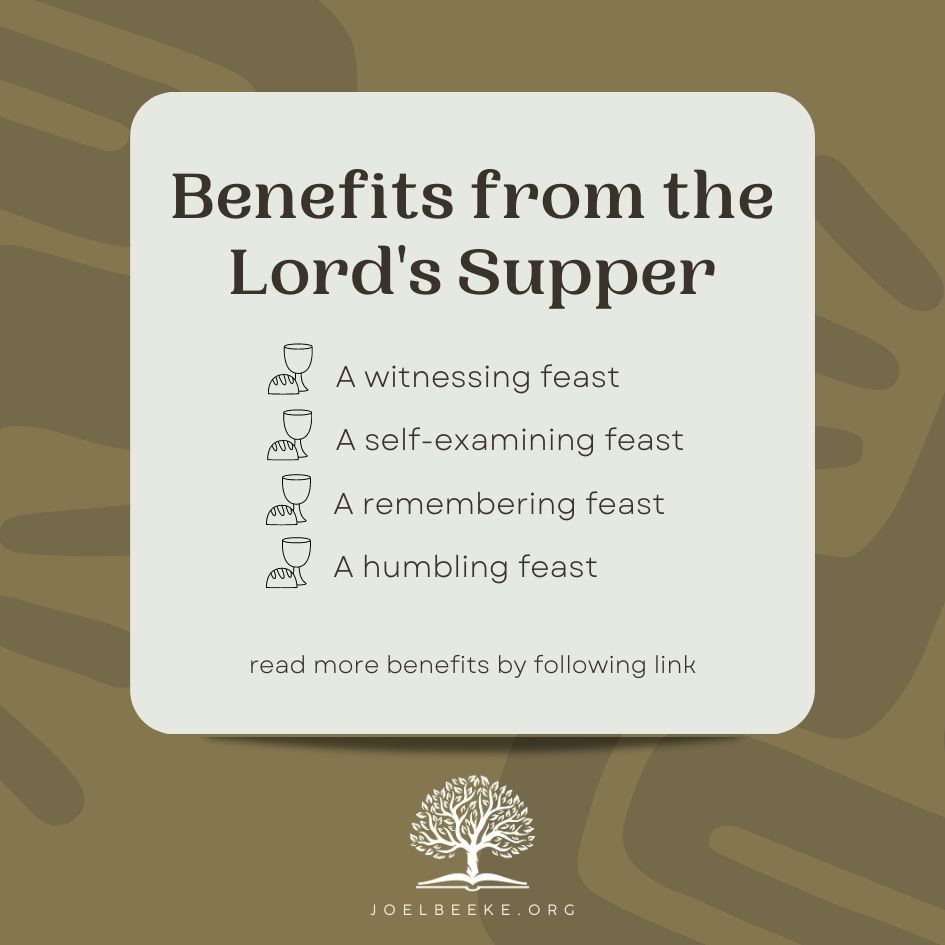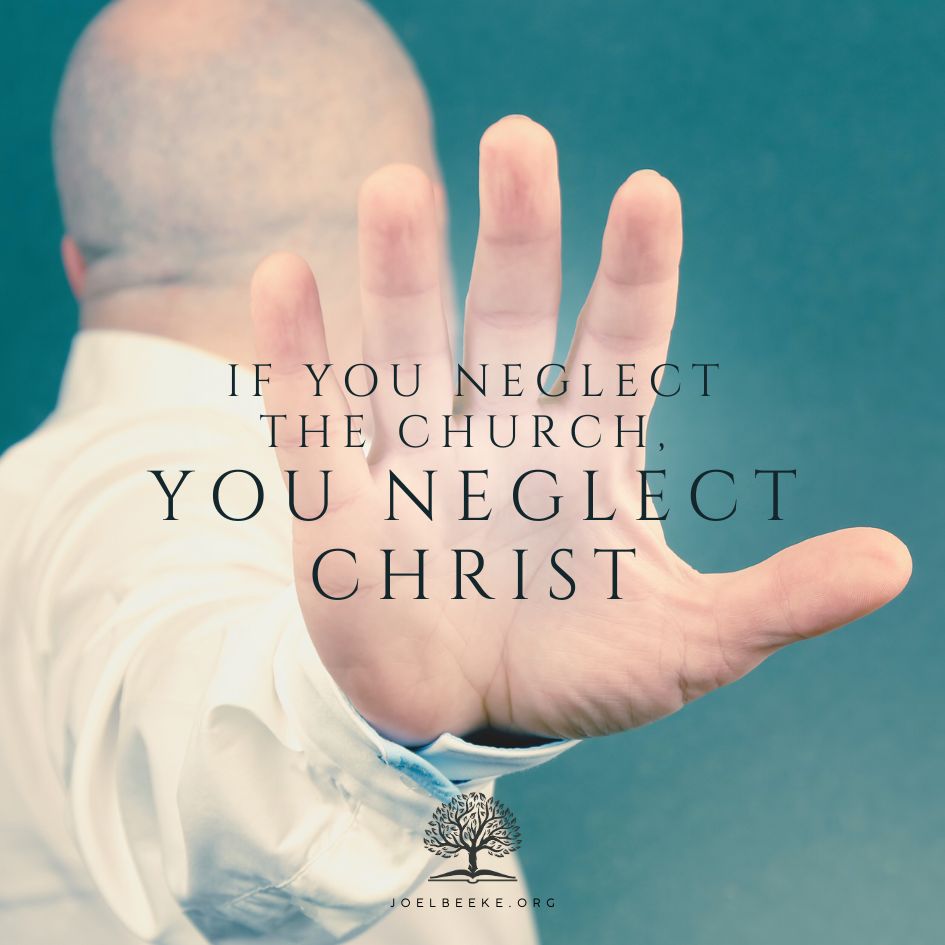
Our Reformed and Puritan forebears were fond of calling the Lord’s Supper a feast. They viewed it as a feast given by the Lord of hosts, the faithful, covenant-keeping God, who, in Christ Jesus, is the author, founder, master, and divine host of this feast. He provides this feast “of wines on the lees, of fat things full of marrow” (Isa. 25:6) for His adopted children to assist them as they traverse the wilderness of this world. Christ Himself, the feast’s provider, is the feast’s provision; He is the feast itself. His person and work are the focal point of the entire sacrament. Believers feast on Him as they receive the bread and wine as His signs and seals of their salvation in Him. By the Holy Spirit’s grace and our appropriation of that grace as believers, it is a Christ-centered feast that is full of benefits for those who partake by faith. At the Lord’s Supper, John Owen said, “Christ and His benefits are objectively offered, and received through the exercising of faith and the sovereign agency of the Holy Spirit.”1Joel R. Beeke and Mark Jones, A Puritan Theology: Doctrine for Life (Grand Rapids: Reformation Heritage Books, 2014), 754; see also 756–59. …We have briefly expounded twenty of these benefits:
- A witnessing feast, by which we do show the Lord’s death until He comes and witness to others that all our hope for this life—and a better life to come—lies in God’s gracious salvation in Jesus Christ
- A self-examining feast, in which we make sure, through the Spirit’s enlightening graces, that we are partaking of the Lord’s Supper in a worthy manner, for Christ’s sake
- A remembering feast, during which we discipline ourselves to meditate on Jesus Christ and Him crucified for us and His faithfulness toward us, as well as appropriate Him and all His benefits
- A humbling feast, in which we are amazed at all that Christ has suffered for our sakes to pay for our sins—and at how well the triune God has treated us all our life until this present moment despite how poorly we have treated Him in return
- A God-fearing feast, throughout which we deepen our filial fear to our faithful and holy Father in Christ, valuing His smiles and frowns to be of greater weight and value than the smiles and frowns of men
- A hoping feast, by which we put all our expectations and confidence in the promises of the gospel and the atoning work of our Savior, to the glory of God
- A self-denying feast, through which we vow to pronounce a death knell to all self-centeredness and waywardness
- A rejoicing feast, in which our hearts overflow with gratitude as we trace God’s mighty works and wondrous ways that reveal His kindness
- A covenanting feast, in which we marvel at God’s giving His Son to us in His covenant faithfulness—and respond by covenanting all that we are and have back to Him, taking the cup of salvation into our hands and paying our vows “unto the LORD now in the presence of all his people” (Ps. 116:13–14)
- A thanksgiving feast, by which we give wholehearted thanks to God for the gift of His Son, for suffering and dying in our place, for all the benefits of His atoning death, and for the privilege of being fed by Him at His table
- A rededicating feast, in which we consciously commit ourselves to Christ’s terms of discipleship—the terms of radical obedience—by denying ourselves, taking up our crosses, and following Him unconditionally (see Luke 9:23)
- A pardoning feast, by which we lay hold of the full pardon and cleansing from all our sins—past, present, and future—in Christ’s blood
- A filling feast, wherein our cup runs over as we feast on all the benefits of Christ’s death for us
- A preserving feast, in which by faith we lay hold of Christ, who not only died for our sins and rose again for our justification but also will keep us from falling and bring us at last into the glory and safety of heaven
- A refreshing feast, by which we partake of the Lord’s Supper sacramentally, through taking, eating, and drinking Jesus Christ spiritually, by faith, for the nourishment and refreshment of our souls
- A heaven-embracing feast, in which, by faith, we transcend the barriers of time and space to sit in the heavenly places with Christ Jesus
- A shepherding feast, by which the Good, Great, and Chief Shepherd fulfills all the tasks outlined for us in the precious Twenty-Third Psalm
- A strengthening feast, by which our weak faith is strengthened and assured, so that we truly believe that as surely as we eat the Communion bread and drink the Communion wine, so surely all our sins are forgiven us by our Father for Christ’s sake, and we are assured that we are His adopted children forever
-
A loving feast, by which our vertical love for the triune God is enflamed so that we commune with Him in His three persons—and all of love’s accompanying graces are deepened and, consequently, our horizontal love for the communion of saints is also augmented
-
A restoring feast, by which we throw ourselves on the mercy of God, confessing our sins and crying out for—and receiving—pardon, cleansing, and restoration
Excerpt From
How Can I Benefit from the Lord’s Supper?
Joel R. Beeke and Ray B. Lanning







